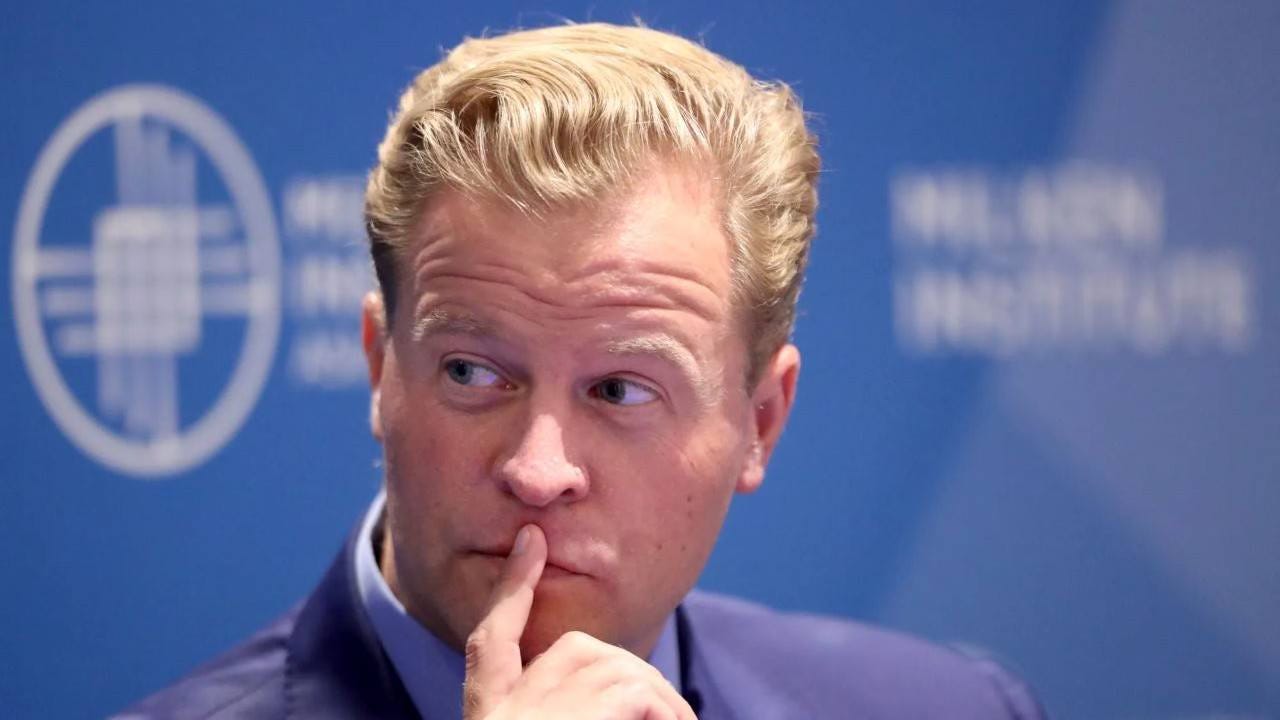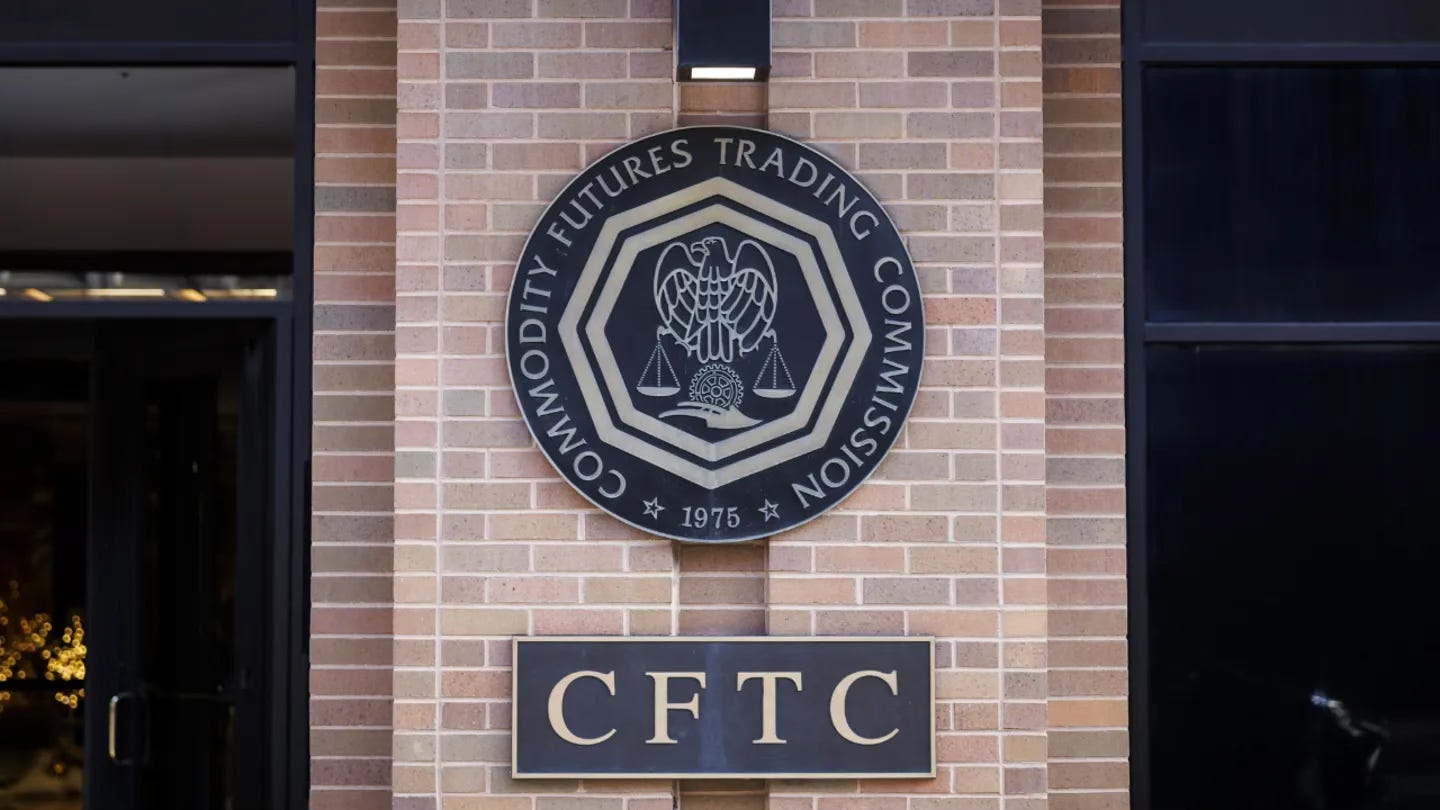What’s Happening with the Brian Quintenz Nomination?
Behind the emails, ethics concerns, and growing opposition delaying Trump’s pick to lead the CFTC
One of the biggest open questions in crypto policy circles is the fate of Brian Quintenz’s nomination to lead the Commodity Futures Trading Commission.
A former CFTC commissioner and executive at the crypto arm of venture capital giant Andreessen Horowitz, Quintenz was, until last week, widely seen in the industry as a shoo-in to lead the agency as it prepares to take on a larger role in digital asset regulation.
So what changed?
Internal emails obtained through a Freedom of Information Act request suggest that Quintenz may have been privy to confidential CFTC information while still serving on the board of Kalshi, a prediction market regulated by the agency. A blog post detailing the emails circulated on Capitol Hill, raising questions about what some viewed as, at best, poor optics and, at worst, potential impropriety.
Billionaire entrepreneur Tyler Winklevoss took the latter view, telling multiple media outlets that the correspondence was deeply concerning and calling Quintenz “the wrong person” to chair the commodities regulator.
The Gemini* co-founder cited a handful of reasons for walking back his support of Quintenz, whom he publicly endorsed in a February X post. Among them, comments from Quintenz’s time as a commissioner prior to 2021 that Winklevoss interpreted as supportive of central bank digital currencies, and his stance that software developers could potentially be held liable for writing code. Both positions are at odds with the Trump administration’s stated policy.
Quintenz’s views, whether current or not, were a matter of public record when Winklevoss initially endorsed his nomination. His subsequent shift appears to center on whether Quintenz may have crossed an ethical line by seeking information that could benefit Kalshi or himself.
Quintenz had no comment.
The revelation came after gambling industry consultant Dustin Gouker published the aforementioned emails, obtained through a FOIA request, on his blog The Closing Line.
They revealed that Kevin Webb, a CFTC staffer expected to become Quintenz’s chief of staff, had requested access to commission and staff information on Quintenz’s behalf as part of a transition plan for his expected chairmanship. In the email, Webb noted that the request had been approved by Acting Chair Caroline Pham.
Several people familiar with standard CFTC transition procedures said nominees across administrations routinely receive factual briefings to help them prepare for the role, including on policy issues, organizational structure, and internal processes.
A CFTC spokesperson told Crypto In America that the agency provided briefing materials and other support to Quintenz throughout the course of his confirmation process.
The email from Webb drawing the most scrutiny showed him requesting a briefing on confidential matters, including “seriatims in circulation, employees on administrative leave, a list of open applications, and ARRP submissions” — some of which, particularly seriatims (commissioner votes in progress), include information not typically shared with individuals outside the agency.
Critics cite this email as evidence that Quintenz may have crossed an ethical boundary, since some of the requested materials could have provided him (and Kalshi by extension) with inside information or an unfair advantage over competitors.
However, two sources close to the process said Quintenz was never briefed on the materials Webb requested.
FOIA In Focus
Meanwhile, some eagle-eyed observers familiar with the FOIA process have noted that the dates on the emails, one as recent as July 16, suggest a surprisingly fast turnaround given that FOIA requests notoriously take weeks or even months to complete.
According to Gouker, who spoke with Crypto In America, he filed the request on the Thursday before Quintenz’s scheduled Monday nomination vote in the Senate Agriculture Committee. He received the requested information, including the emails, the very next day, Friday, and published his findings in a Saturday blog post. On Monday afternoon, the White House asked the Senate Agriculture Committee to delay the vote without providing a reason.
While he declined to comment on what prompted his initial inquiry, Gouker said he was surprised by the agency’s unusually fast response.
“For anyone who has ever done a FOIA request at any level of government, you obviously would never expect a response that quick,” he said.
Gemini’s DCM Application
In his blog, Gouker speculated that the requests for access to lists of open applications could relate to various licenses, possibly including Designated Contract Markets, a license to list derivatives that’s currently held by a handful of firms including Coinbase and Kalshi.
Gemini, co-founded by the Winklevoss twins in 2014, currently has an application pending at the CFTC for a DCM license under its affiliate Gemini Titan, LLC. The company had initially filed the application in 2020 but withdrew it amid the Biden administration’s regulatory crackdown on crypto. Gemini was also sued by the CFTC that year for allegedly making false statements about a planned bitcoin futures contract, a case it settled in January.
According to the CFTC’s website, Gemini refiled its application for a DCM this year, which is currently listed as pending. However, a document dated June 10 shows the CFTC has stayed the application due to incomplete documentation.
If eventually approved, Gemini would join Coinbase as one of the few crypto-native platforms operating regulated derivatives exchanges in the U.S. Last week, Coinbase announced plans to launch prediction markets, positioning itself as a direct competitor to Kalshi, where Quintenz still holds a board seat and stock.
It’s unclear whether Gemini plans to follow Coinbase into the event contracts space.
The exchange had no comment.
The Gaming Industry: A Powerful Enemy?
Other forces working against Quintenz include the multi-billion dollar gaming industry, whose lobbyists have criticized his support of prediction markets, a business model they view as a potential threat to traditional gambling interests.
Last month, the American Gaming Association, along with 17 tribal organizations and other major gaming groups, sent a joint letter to the Senate Agriculture Committee urging a more rigorous review of Quintenz’s nomination.
Unconfirmed reports suggest gambling industry proponents have also been lobbying the White House, fueling speculation that this may have influenced the administration’s decision to pause Quintenz’s confirmation.
On Monday, Rep. Dina Titus (D-NV), co-chair of the Congressional Gaming Caucus, called on the CFTC to investigate Quintenz, citing his board seat and stock holdings at Kalshi. In a letter to Acting Chair Pham, Titus referenced the FOIA emails and said the public deserves to understand the extent of his financial interest in a sector he may soon have a hand in regulating. She also questioned whether Quintenz could serve as an impartial regulator given his close ties to the firm.
In a letter to a CFTC ethics official in May, Quintenz said he would resign from Kalshi’s board, divest his shares and recuse himself from matters concerning the company if confirmed.
What’s Next?
The White House’s request to delay the Senate Agriculture Committee vote has left the timeline for Brian Quintenz’s confirmation uncertain. With the Senate now in recess, a vote to advance his nomination out of committee is not expected until at least September. It also remains unclear whether the administration will continue to push forward amid the recent controversies.
Still, White House spokesperson Liz Huston reaffirmed the administration’s support in a statement last Wednesday: “Brian Quintenz remains President Trump’s nominee to serve as chairman of the CFTC,” she said. “He will help execute President Trump’s mission to make America the crypto capital of the world, and we look forward to his swift confirmation.”
In the meantime, the CFTC is operating with a skeleton crew. Only Acting Chair Caroline Pham and Democratic Commissioner Kristin Johnson remain, after three other commissioners — Rostin Behnam, Summer Mersinger, and Christy Goldsmith Romero — left earlier this year. The White House has not yet nominated replacements for their seats.
Some industry players have questioned whether the White House would turn to Pham as a replacement if Quintenz’s nomination is dropped. However, as Crypto In America first reported, Pham announced her intention to return to the private sector upon Quintenz’s confirmation and, according to multiple people familiar with the matter, has been actively job hunting since.
Johnson has also announced her intention to leave but has not specified a timeline.
If Pham steps down before a replacement is confirmed, Johnson would be the sole remaining commissioner just as the agency is being asked to lead on regulating spot crypto markets under the CLARITY Act, now pending in the Senate and intended to create a market framework for digital assets.
One industry executive, who wished to remain anonymous, called the situation with Quintenz “frustrating,” describing him as “excellent” and noting his expertise in the space. The executive lamented that the absence of a permanent leader and a partially staffed commission could delay legislation and regulatory progress at a critical moment for crypto policy.
Others Crypto In America spoke with were reluctant to share their views on Quintenz or the situation publicly. His former employer, Andreessen Horowitz, has not weighed in on the controversy and declined to comment for this story.
Kalshi also did not comment.
* Note: Gemini is a sponsor of the Crypto In America podcast and newsletter.








Busy week! We got more than the usual Monday, Wednesday, Friday articles. Keep up the great work!